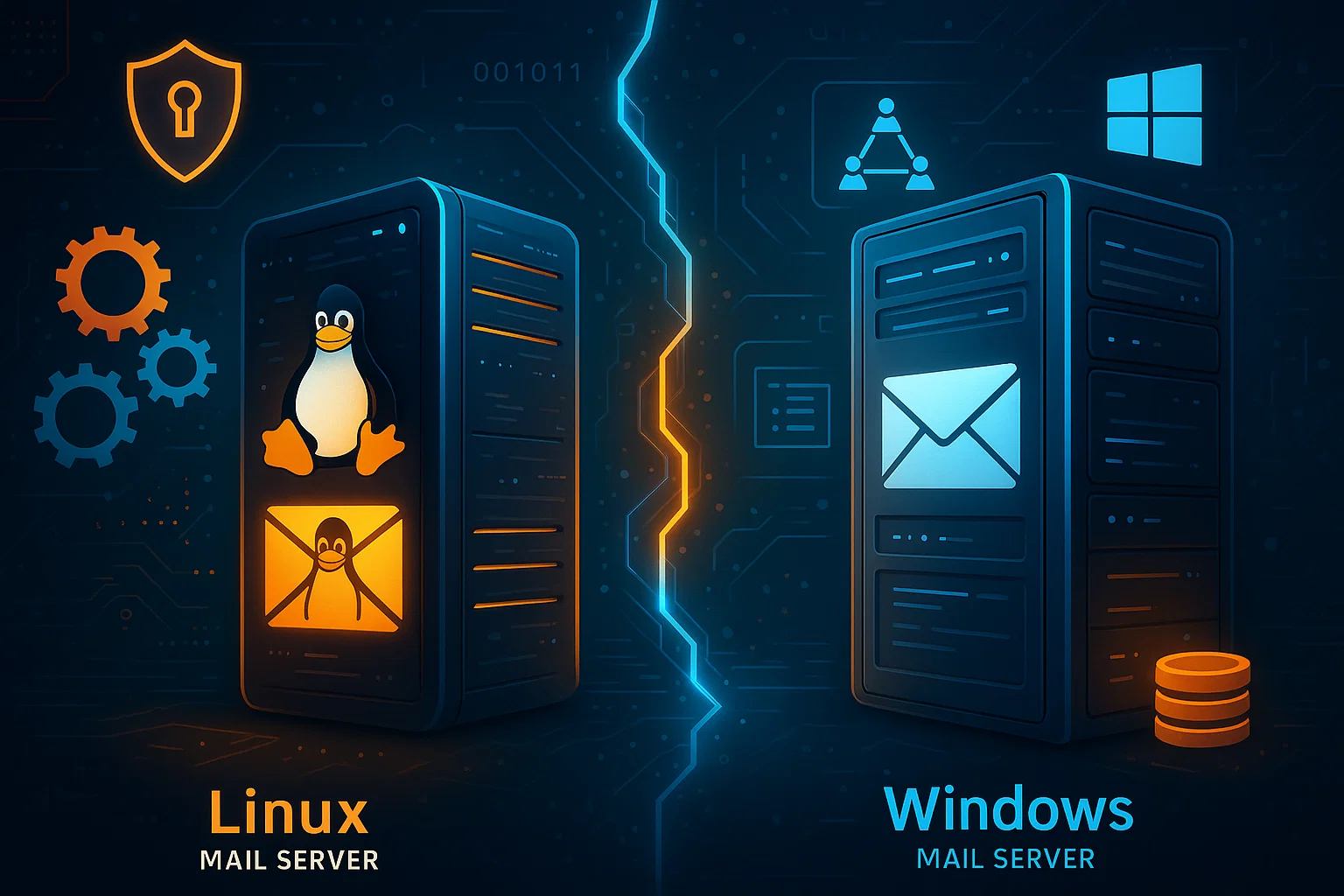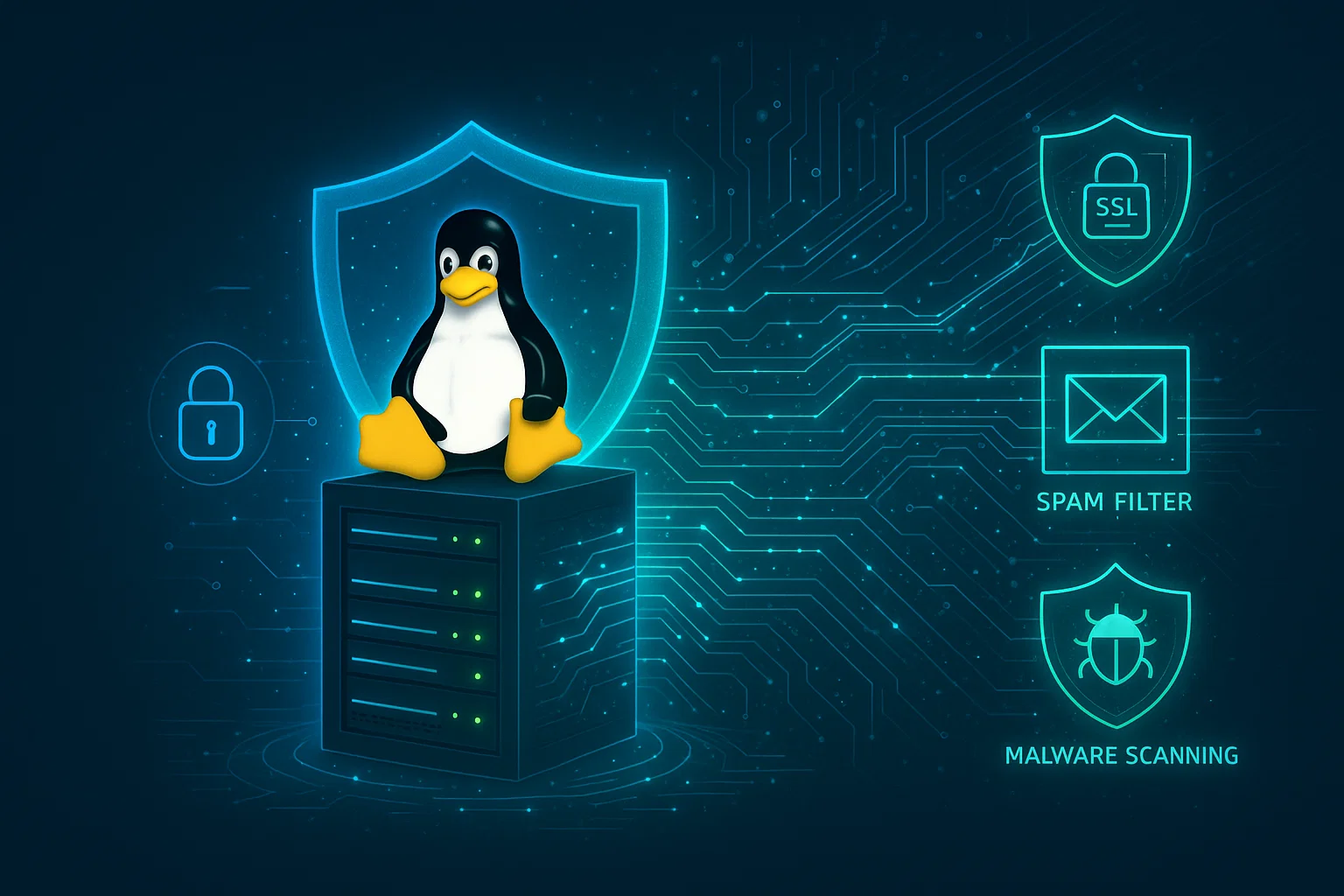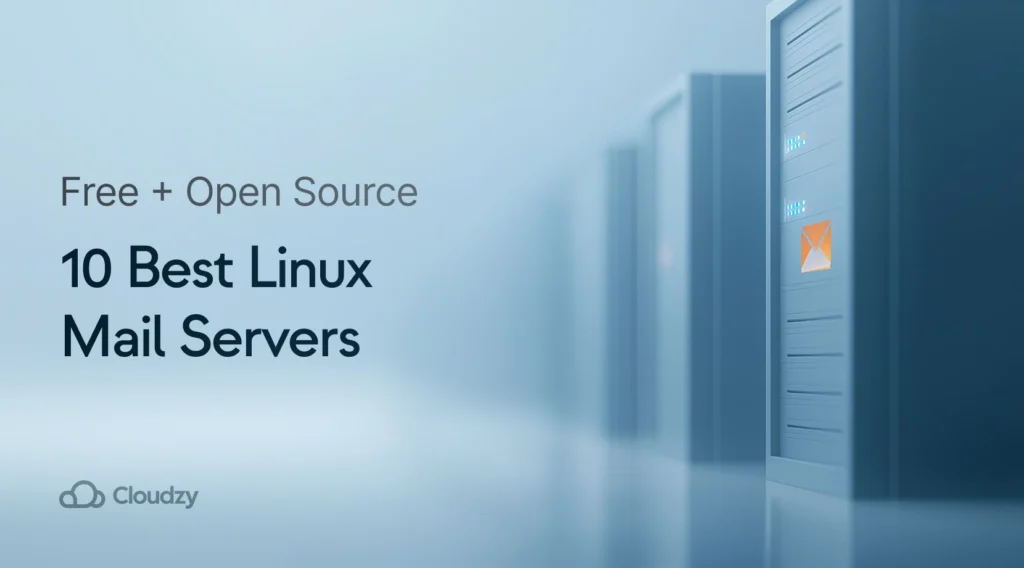Setting up corporate email infrastructure can turn into a complete disaster if you pick the wrong solution. Whether you’re running a small business or managing enterprise operations, your choice of the best Linux mail server directly impacts security, scalability, and whether you’ll be troubleshooting delivery issues at ungodly hours.
Email traffic keeps exploding worldwide, and honestly? Having solid email infrastructure isn’t optional anymore—it’s survival. Modern solutions featuring the best Linux email server technology pack serious features like spam filtering, encryption, and seamless integration with existing systems.
What is a Mail Server?

The best mail server for Linux handles email transmission, storage, and delivery across networks. These systems (also called Mail Transfer Agents or MTAs) manage both incoming and outgoing email traffic using standardized protocols like SMTP, IMAP, and POP3.
Here’s the reality: over 376 billion emails fly around daily in 2025. When evaluating server infrastructure, Linux’s best mail server architecture provides superior stability and customization options compared to proprietary alternatives.
Requirements for Hosting a Linux Mail Server

Deploying your own best email server for Linux offers significant advantages. Enhanced privacy, complete control over email data, and improved security for sensitive communications. Linux distributions power 96.3% of the top million web servers worldwide.
When implementing the best open source mail server for Linux, proper planning ensures peak performance and security. Linux VPS hosting strikes the perfect balance between performance and cost-effectiveness for mail server deployment, ensuring your best free email server for Linux runs at peak efficiency.
How to Choose the Right Mail Servers for Linux
Selecting the best Linux mail server requires careful evaluation of several critical factors. Feature compatibility stands first—does the mail server support your required protocols? Does it integrate with existing authentication systems?
Organizational scale significantly influences your choice. Small businesses might find lightweight solutions like Mail-in-a-Box sufficient, while enterprises need robust servers like Apache James or Zimbra that can handle thousands of simultaneous connections.
| Mail Server | Best For | Difficulty | Key Strength | Deployment | Pricing |
| Postfix | Enterprise/Production | Medium | Most reliable, widely supported | Traditional | Free |
| Dovecot | IMAP/Storage | Medium | High-performance message storage | Traditional | Free / Pro plans available |
| Mailcow | SMB/Modern Setup | Easy | Web UI, containerized | Docker | Free |
| Docker Mailserver | DevOps/Containers | Easy | Quick deployment, maintenance | Docker | Free |
| Mail-in-a-Box | Beginners | Very Easy | Automated setup, DNS included | Single-click | Free |
| Exim | Academic/Complex | Hard | Flexible routing, customization | Traditional | Free |
| Maddy | Modern/Secure | Medium | Single binary, modern features | Binary | Free |
| WildDuck | API/Scalability | Hard | API-first, high volume | MongoDB | Free |
| iRedMail | All-in-one | Easy | Complete package, web admin | Script | Free / Pro plans from $10/mo |
| Apache James | Java Enterprise | Hard | Enterprise features, clustering | Java/JVM | Free |
10 Linux Mail Servers Worth Your Time in 2025

After extensive testing and evaluation, these ten solutions represent the cream of the crop for Linux email infrastructure in 2025. Each brings unique strengths—from enterprise-grade reliability to beginner-friendly automation—covering every major use case and deployment scenario you’ll encounter.
1. Postfix
Postfix dominates the enterprise landscape as the most widely deployed best Linux mail server in 2025. It ships as the default MTA across Ubuntu, CentOS, and countless other distributions. Originally conceived as a Sendmail replacement, Postfix has evolved into something more sophisticated.
I’ve wrestled with Postfix configurations more times than I care to remember. The learning curve can be steep, but once you understand its philosophy, everything clicks into place.
Key Features:
- Advanced spam protection
- Comprehensive database support (MySQL, PostgreSQL, LDAP)
- Virtual domain management
- SSL/TLS encryption
- Automatic queue management with intelligent retry mechanisms
2. Dovecot
Dovecot reigns supreme in the IMAP and POP3 server realm. This best Linux email server specializes in secure message storage and retrieval with a high-performance architecture that’s been battle-tested across millions of user deployments.
What sets Dovecot apart from competitors? Speed and reliability that scales beautifully. Even when dealing with massive mailboxes containing years of accumulated messages, it maintains responsiveness that puts proprietary solutions to shame.
Key Features:
- Advanced mailbox formats (Maildir/mbox)
- Full-text search with Solr integration
- Comprehensive authentication systems (LDAP/SQL)
- SSL/TLS encryption with perfect forward secrecy
- Real-time replication capabilities
3. Mailcow
Mailcow has emerged as the containerization champion among the best Linux email server solutions. It delivers a complete email infrastructure through Docker deployment with a web-based interface that actually makes server management enjoyable rather than painful.
Docker revolutionized deployment strategies, and Mailcow proves why containerization matters for modern infrastructure. The automatic SSL certificate provisioning alone saves countless hours of tedious configuration work. Understanding Linux mail server antivirus protection strategies becomes crucial for comprehensive security implementations.
Key Features:
- Integrated webmail interface
- Advanced spam filtering via Rspamd
- Built-in antivirus scanning (ClamAV)
- Comprehensive backup/restore functionality
- Multi-domain support
- API access
4. Docker Mailserver
Docker Mailserver delivers production-ready containerized email solutions designed specifically for modern infrastructure environments. This best Linux mail server brilliantly combines Postfix, Dovecot, and essential security components into a single manageable container with automated configuration that eliminates most manual setup headaches.
If your infrastructure already runs on Docker, this solution integrates seamlessly without introducing complexity. Single container deployment means simplified maintenance, predictable resource usage, and straightforward scaling strategies.
Key Features:
- Complete SMTP/IMAP functionality
- Integrated spam filtering capabilities
- Automatic SSL/TLS certificate management
- LDAP authentication support
- Comprehensive logging systems
5. Mail-in-a-Box
Mail-in-a-Box focuses obsessively on user-friendly deployment while maintaining functionality that satisfies most organizational requirements. This best open source mail server for Linux, automates complex configuration tasks that typically require deep technical expertise, and provides complete infrastructure, including DNS management.
Perfect for situations where you need email working yesterday, not next month, after extensive configuration and debugging. The automated approach eliminates common configuration mistakes that plague manual installations. For detailed setup guidance, consult How to create mail server tutorials.
Key Features:
- Automated DNS configuration and management
- Integrated webmail with calendar/contacts functionality
- Automatic backup integration with Amazon S3
- Let’s Encrypt SSL certificates with automatic renewal
- Spam filtering
- Modern authentication protocols (SPF, DKIM, DMARC)
6. Exim
Exim thrives in academic and research environments where flexibility trumps simplicity. This best free email server for Linux provides extensive routing capabilities and sophisticated message processing through rule-based configuration systems that can handle virtually any routing scenario you can imagine.
Exim’s true strength emerges when dealing with complex routing requirements that would break simpler solutions. Need to route messages based on sender reputation, content analysis, or byzantine organizational policies? Exim handles it all gracefully.
Key Features:
- Flexible routing and address rewriting capabilities
- Comprehensive database integration options
- Advanced content filtering mechanisms
- SSL/TLS encryption with STARTTLS support
7. Maddy Mail Server
Maddy represents the evolution of Linux mail server technology, designed from scratch with modern security principles and simplified deployment philosophies. This Go-based server offers contemporary alternatives to legacy mail infrastructure through single-binary deployment.
Single binary deployment feels refreshing after dealing with traditional multi-component installations. No more hunting through configuration files scattered across different directories or managing dependency conflicts.
Key Features:
- Modern TLS implementation with automatic ACME certificate support
- Integrated spam filtering and content scanning capabilities
- SQLite/PostgreSQL database backend support
- Comprehensive IPv6 compatibility
- Automatic DKIM signing and verification
8. WildDuck
WildDuck introduces genuinely innovative approaches to email server management through scalable, API-driven architecture. This solution focuses specifically on programmatic control and high-volume message processing with MongoDB-based storage systems that provide horizontal scaling capabilities traditional file-based systems simply cannot match.
The API-first architecture transforms email server management from manual configuration tasks into programmable infrastructure. Developers can integrate email functionality directly into applications without wrestling with traditional configuration files.
Key Features:
- API-first architecture enabling deep automation
- MongoDB storage with automatic sharding capabilities
- Comprehensive Unicode support for international deployments
- Built-in two-factor authentication mechanisms
9. iRedMail
iRedMail delivers comprehensive email solutions that emphasize security and user-friendly management approaches. This solution includes integrated administration tools with intelligent installers that automate complex configuration procedures while maintaining security best practices.
The installer approach eliminates weeks of manual configuration and debugging. Rather than assembling components manually, iRedMail handles integration details automatically while maintaining flexibility for customization when needed.
Key Features:
- Web-based administration panels with intuitive interfaces
- Multiple database backend support (MySQL, PostgreSQL, LDAP)
- Comprehensive spam and virus protection systems
- SSL/TLS encryption with automatic certificate management
10. Apache James
Apache James provides enterprise-grade email functionality through a mature Java-based architecture that supports modern protocols while offering extensive customization through modular design principles. The selective component deployment approach enables organizations to build exactly the email infrastructure they need without unnecessary bloat.
Java infrastructure integration feels natural if your organization already operates Java-based systems. The modular architecture philosophy allows precise control over which components get deployed, optimizing resource usage and reducing attack surface area.
Key Features:
- Comprehensive protocol support (SMTP/IMAP/POP3/JMAP)
- Flexible storage backends, including Cassandra and PostgreSQL
- Advanced mail processing with custom Mailet development capabilities
- Scalable clustering support for high-availability deployments
Comparing Linux Mail Servers with Windows Solutions

Evaluating mail server options requires understanding how Linux solutions compare with Windows alternatives. Platform choice impacts everything from licensing costs to security models. For detailed comparisons, explore the best mail servers for Windows to understand different platform approaches and their respective trade-offs.
Linux mail servers typically deliver superior customization capabilities, lower resource requirements, and stronger security postures compared to Windows-based alternatives. However, Windows environments benefit from tighter Active Directory integration and familiar management interfaces.
Security Considerations for Linux Mail Servers

Implementing any best Linux mail server demands meticulous attention to security considerations. Modern email threats evolve constantly, making comprehensive protection measures absolutely essential for organizational survival. Understanding that 94% of malware arrives via email puts the security challenge into proper perspective—your mail server represents the primary attack vector for most cybersecurity threats.
Essential security elements include proper SSL/TLS configuration with strong cipher suites, regular security updates applied promptly, comprehensive spam filtering with machine learning capabilities, real-time malware scanning, and robust authentication mechanisms, including multi-factor authentication where possible. Consider implementing multiple security layers, including network-level filtering, application-level scanning, and user education programs.
Understanding Mail Server Components

Every comprehensive email solution requires understanding key components like Sendmail, Cyrus IMAP, and supporting technologies that work together to create a functional email infrastructure. Traditional solutions combine multiple specialized components to create complete systems, while modern containerized approaches simplify operational complexity by packaging everything together into manageable units.
Choosing the Right Solution
Selecting among these best Linux mail server options depends on specific organizational requirements, available technical expertise, and long-term strategic objectives. Simple deployments often benefit from automated solutions like Mail-in-a-Box that minimize configuration complexity. Enterprise environments typically require maximum flexibility that traditional solutions like Postfix, combined with Dovecot, can provide.
Container-based solutions, including Mailcow and Docker Mailserver, offer modern deployment methodologies with simplified maintenance procedures. Security-focused implementations benefit from solutions like Maddy, which incorporates modern security principles directly into its foundational design rather than adding protection as an afterthought.
Conclusion
The landscape of the best Linux mail server solutions available in 2025 offers remarkably diverse options addressing virtually every conceivable organizational requirement. Modern implementations successfully incorporate advanced security features, simplified deployment mechanisms, and comprehensive management interfaces that rival expensive commercial alternatives.
Success with any Linux mail server solution requires careful planning phases, adequate resource allocation, and commitment to ongoing maintenance responsibilities. Linux VPS hosting provides an excellent foundation for mail server deployments, offering scalable computing resources and global availability that ensures optimal performance regardless of user location.




4 thoughts on “10 Best Linux Mail Servers in 2025 (Free + Open Source)”
Heya just wanted to give you a brief heads up and let you know a few of the images aren’t loading properly.
I’m not sure why but I think its a linking issue.
I’ve tried it in two different web browsers and both show the same outcome.
Thanks for flagging this. The images on our guide to the best Linux mail server should load correctly, so the issue may be with cached files or outdated links. We’ll review and update the image paths.
Cloudzy Team
each time i used to read smaller articles which also
clear their motive, and that is also happening with this article
which I am reading at this time.
Glad you found it clear. If you’re also comparing options beyond the best Linux mail server, we’ve broken down Windows alternatives too. Covering features, performance, and security trade-offs. You can see that analysis here: best mail servers for Windows
Cloudzy Team